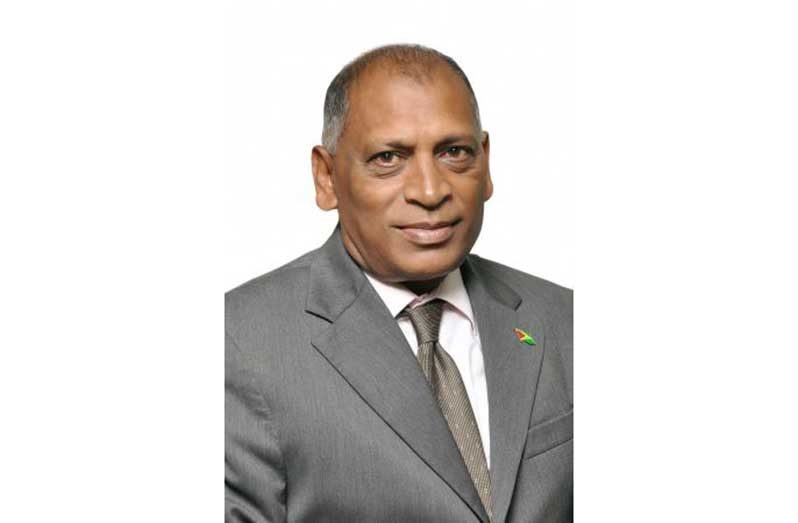–demands fair compensation for carbon credits
AMBASSADOR Dr. Leslie Ramsammy, Guyana’s Permanent Representative to the United Nations (UN) Office at Geneva, has made a compelling call for fair compensation for carbon credits during an Interactive Dialogue on Climate Change and Human Rights hosted by the UN Special Rapporteur on Human Rights on Thursday, September 19, 2024.
Speaking on behalf of Small Island Developing States (SIDS) and the Caribbean Community (CARICOM), Ambassador Ramsammy highlighted the urgent need for climate justice and fair treatment for countries that contribute minimally to global emissions but bear the brunt of climate change impacts.
“In the face of increasing threats, we believe that climate justice is a legitimate human rights challenge,” stated Dr Ramsammy.
He emphasised that ignoring the human rights implications of the devastation caused by extreme climate events is a failure of moral and legal responsibility on the part of global institutions.
His message was clear: The world must recognise the disproportionate burden carried by SIDS and provide fair compensation for their efforts in mitigating climate change.
Ambassador Ramsammy underscored the existential threat that climate change poses to Caribbean nations and other SIDS. He said even a 1.5°C rise in global temperatures, which now seems unavoidable, will continue to bring extreme weather events, such as more intense storms.
He added: “Along with heavy or continuous rainfall events, ocean acidification, increased marine heatwaves, rising sea levels together with storm surges resulting in coastal inundation, saltwater intrusion into aquifers, shoreline retreat, irrigation systems for agriculture, as well as more severe agricultural and ecological droughts.”
According to him, these events lead to significant economic losses, often wiping out years of progress in a single storm. He cited the recent devastation caused by Hurricane Beryl as an example, where the loss of Gross Domestic Product (GDP) equaled several years of gains for affected countries.
Despite contributing less than 0.2 per cent of global greenhouse gas emissions, he pointed out that SIDS are disproportionately affected by the climate crisis.
“It is a denial of our human rights that we must face the growing toll of loss and damage, with cataclysmic and existential implications for the Caribbean and SIDS, when we are not responsible for the negative drivers of destructive climate change events,” he said.
Ambassador Ramsammy highlighted the Bridgetown Initiative as part of the broader climate justice agenda but expressed disappointment over the lack of support and prominence it has received.
He urged the Special Rapporteur to prioritise climate justice within the Human Rights agenda and called for a stronger presence of this issue at the 2024 United Nations Climate Change Conference or Conference of the Parties of the United Nations Framework Convention on Climate Change (UNFCCC), more commonly known as COP29.
Dr Ramsammy also criticised the failure of the developed world to meet its commitments to climate finance. The promise to deliver at least USD100 billion annually by 2020 has not been fulfilled, with the majority of resources still directed towards mitigation efforts, while adaptation receives a mere 20 per cent of climate finance, Ambassador Ramsammy highlighted.
He added that the Fund for Loss and Damage, established under the Paris Agreement, has also fallen short of meeting the needs of those who are most vulnerable to climate impacts.
“Guyana urges the Special Rapporteur to ensure that climate justice has a strong presence in COP 29. Our demand for climate justice and the assurance that our survival will not be compromised is not merely another hand stretched out for handouts. It is our plea for support in bearing the ravages of events we did not cause.”
A significant portion of the ambassador’s speech focused on the need for fair compensation for ecosystem services provided by forests, which play a critical role in climate and atmospheric regulation.
He pointed out that Guyana, along with other SIDS countries, serves as a vital “lung for the world,” preserving a sizeable carbon reservoir and sink through its rainforests and mangrove ecosystems.
Ambassador Ramsammy continued: “The carbon reservoirs that we own have become global assets, without meaningful compensation for the owners. The carbon market, therefore, is a human rights issue. Presently, the compensation for preserving our rain and mangrove forests is far from fair.”
He said that Guyana has been a pioneer in the carbon credits market under the REDD+ (Reducing Emissions from Deforestation and Forest Degradation) framework.
“Guyana under the REDD+ architecture has earned 33M TREES [The REDD+ Environmental Excellence Standard] as carbon credit for the period 2016 to 2020, the only country presently that has officially been certified for carbon credits. It is the only country at this time that is certified to offer carbon credits to the aviation industry,” Dr Ramsammy said.
However, despite selling 30 per cent of its carbon credits, he noted that Guyana has faced challenges in securing fair market value for them.
“The value that the world is offering is considerably and unconscionably less than what carbon credits ought to be worth,” lamented Ambassador Ramsammy.
He urged the Special Rapporteur to place the carbon credit market on her agenda and to advocate for meaningful and fair compensation for carbon credits globally.



.jpg)








